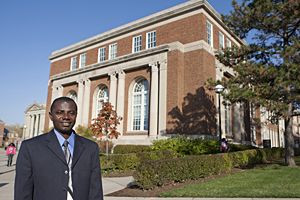AIDS Remains a Concern for African Immigrants in U.S.

With World AIDS Day approaching on Dec. 1, a survey finds that AIDS remains a public health concern among African immigrants in the U.S.
The survey included just over 400 African immigrants in Ohio, ages 21 to 61 with an average age of 36. Sixty percent were male, and 30 percent were female, according to research from the University of Cincinnati.
The aim was to examine attitudes about AIDS/HIV and sex, subjects of which are considered taboo for discussion in many parts of Africa, where HIV/AIDS infection and the death rate from AIDS is the highest in the world.
The 64 question survey, carried out by visiting professor Matthew Asare of Northern Kentucky University, examined attitudes about condom use, monogamous behavior, and sexual communication.
51 percent of the participants reported they had been sexually active in the past month, but did not use condoms, said Asare.
Out 412 people, 87 percent reported having sex with a single partner in the past month while 12 percent reported having had multiple sexual partners.
“Polygamy is acceptable behavior in some parts of Africa, so I also wanted to examine attitudes about polygamy as this population adapted to a new culture in the United States,” Asare says. “The survey found that out of the 12 percent reporting multiple sexual partners, the majority of those respondents reported that they had not used condoms, nor had they discussed their sexual history with their partners.”
The participants who reported that they did not use condoms with multiple partners said they did not fear the possibility that they would get HIV/AIDS because “they did not feel that they were susceptible.”
Asare found that women are less likely than men to initiate communication about sexual history party because they felt that communication and the initiation of condom use would cause mistrust in a stable relationship.
Funded by CECH, the survey also found that some of the respondents had open communication with their parents about sex when they were young, which in turn, made them more likely to open those communication channels with their partner.
Asare added that those participants who were more integrated in the American culture were also more likely to be open about sexual communication and safe-sex practices.
Asare said that he is interested in future research into promoting health education to African immigrants and designing intervention programs specifically geared toward different African cultures.
The authors wrote that Asare’s research led to the completion of his PhD last summer from UC’s health promotion and education program in the College of Education, Criminal Justice, and Human Services (CECH).



























